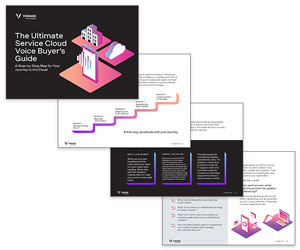Mike Pallagi at Vonage looks at UCaaS or VoIP and which is right for your business.
When voice over internet protocol (VoIP) came on the market many years ago, it revolutionized the ways businesses could communicate domestically and internationally.
Today, technologies like unified communications as a service (UCaaS) take the same baseline functionality and give it even more flexibility and viability in a broader number of business use cases.
But for those weighing UCaaS vs. VoIP, the challenge isn’t knowing whether to use one or the other, but whether the best option is to combine them both. Let’s look at each and then compare them directly to help you choose.
What Is VoIP?
VoIP lets businesses connect their phone services via the internet instead of the wired connectivity that callers depended on in the past.
It gives companies all the benefits of a landline phone, like the ability to place calls to other phones, but with the flexibility to make calls from any device — say a tablet or laptop — with the right permissions and an internet connection.
What Is UCaaS?
UCaaS takes the capabilities of VoIP to another level. It helps businesses flourish by unifying voice, video, personal or group messaging, contact centres, chat apps, and even certain business-specific programs like CRMs into a single cloud-based communications system that’s accessible anytime from any of a user’s internet-connected devices.
With a robust UCaaS solution, teams can message colleagues, video chat with clients, place voice calls to vendors — and seamlessly switch between channels without disconnecting the initial interaction.
How Does VoIP Work?
VoIP works by letting businesses make calls over the internet that they’d usually make via a landline. In turn, this allows them to make more calls at a higher volume and at larger distances than they would with a dedicated phone service.
In this regard, the UCaaS or VoIP debate is somewhat of a misnomer, since VoIP functionality is typically built into the unified communications platform you choose.
The way VoIP emulates and expands on the features that wired services offer can benefit every business setting and organizations of any size.
Features such as simultaneous ring, which forwards a call from a desk phone to a mobile device, ensure important calls always get through.
Auto attendants route business calls to the right people quickly, reducing the possibility of missed opportunities. And VoIP’s straightforward dial-in conferencing capabilities mean you can quickly connect business partners and employees.
How Does UCaaS Work?
The core value of UCaaS is bringing sources of information and communication — including foundational technologies like VoIP — together and making them accessible for everyone in the organization regardless of where or how they work.
Built to help businesses integrate their most important communication tools and data sources, the technology’s ability to combine everything into a single stream lets organizations bring a level of real-time interactivity to operations, busting silos and enabling cohesive movement and growth.
With a Salesforce integration, for example, a company can take call notes and send real-time user activity reports. Another organization, meanwhile, might use UCaaS to create and host training sessions or meetings that are accessible from any internet-connected device.
These tools are generally affordable and flexible enough to effectively transform enterprises of any size, even small and midsized organizations.
What Are Some Benefits of Using VoIP?
Less Reliance on Legacy Hardware
The phones of yesteryear were massive technical endeavors. Getting something as simple as multiple incoming and outgoing extensions required substantial space in the “phone room” and on the desks of employees who needed to make calls.
Because “soft” solutions like VoIP work over the internet, a computer or desk phone with an internet connection can do the same things that would have taken teams of installers and piles of hardware to accomplish.
More Flexibility for Business Needs
That scalability applies at the whole-business level, too. Adding VoIP and associated features can be done from a web browser via self-service tools, and the numbers you implement are available the moment you click.
That can make managing things like seasonal volume spikes, unexpected upticks in sales, remote working, and even downturns easier because the pricing models and technology behind VoIP are both far more flexible to individual business needs.
Cheaper International Calling
Arguably the top reason businesses originally invested in VoIP was that the technology’s data-backed architecture meant long-distance and international calls cost less than wired services — typically substantially less.
That makes it an unignorable presence in any business that counts geographical distance and cost among its communication challenges.
What Are Some Benefits of Using UCaaS?
Full Communications Mobility With Less Disruption
For many organizations, finding technology tools to support communication is a balancing act. It can be difficult to find options that can be used any way people choose to work without disrupting processes that otherwise suit the organization — a problem that presents itself in small businesses, big enterprises, and everything in between.
UCaaS can help address that by combining the tools and functionalities you need into a single, cross-functional system. In the post-pandemic world, that kind of flexibility can be invaluable.
Companies with existing processes that rely on VoIP technology, for instance, could more easily loop in their existing solution alongside other, more advanced upgrades, such as web-based collaboration software.
International Reach in Numerous Device Formats
Relief International’s partnership with Vonage illustrates another benefit for companies considering UCaaS or VoIP.
The organization, which provides vital assistance to disaster-torn communities around the globe, uses mobile phones and a UCaaS solution to bring a number of essential functionalities — and information — to clients and employees.
Without a unified platform flexible enough to put these functions in one place, the company would likely find itself balancing dozens of apps and multiple points of hardware just to achieve a baseline of affordable, functional communication.
As with other examples, VoIP proves a foundational presence here as part of the larger UCaaS offering, bringing important capabilities like affordable international calling to the stack of tools Relief International relies on.
Less Reliance on Hardware and Less Spending
Communicating as a business at any scale can become expensive quickly. Because a simple sales conversation may ultimately take place on multiple device formats and network types, overreliance on specialized hardware — everything from the servers on the backend to the devices employees use on the edge — can become an issue.
UCaaS gives businesses the opportunity to put multiple functions within a single environment and distribute it all from the cloud, which can equal a vast reduction in the amount of hardware your business must ultimately buy, update, and maintain.
Again, we can see VoIP’s influence in the mix: Just as that technology helps companies dial back their reliance on legacy PBX technology and hardware, UCaaS, which contains VoIP as one of its technologies, further helps businesses cut back on the devices they must use to achieve advanced functionality.
Let’s compare some of the benefits of UCaaS and VoIP.
| UCaaS | VoIP |
|---|---|
| Great for connecting and evolving a company’s existing processes | Takes phone calls and standard features such as caller ID and call waiting and allows them to occur over a digital network instead of a wired phone or cell network |
| Integrates and interlinks multiple tools in the same environment | Enables substantially less expensive international and long-distance calling |
| Mixes every-way communication (voice, video, and SMS) with other key business platforms, such as customer relationship management and scheduling | Allows businesses to quickly up- and downscale the number of phone extensions in use |
| Helps businesses centralize and expand their model | Is often built into UCaaS solutions as the voice component |
| More functionality out of less local backend and edge hardware | Lets businesses make calls without needing dedicated phones |
| Best for businesses looking to centralize tasks and bring advanced capabilities everywhere | Best for companies looking to expand their voice calling features and output |
How to Set Up UCaaS and VoIP
The first step in your journey should be to speak with an expert who can give you a full view of the capabilities that matter to you to inform your UCaaS and/or VoIP decision.
Diving into the first or cheapest option you find can lead to costly, inefficient integrations that don’t fully suit the business’s needs.
Making the Choice: What Is Right for Your Business?
Take a look at your business needs and how you communicate internally and externally. Some of the most important considerations will be:
- Which device(s) your team uses to communicate (smart phones, computers, or desk phones)
- How many employees you have
- What features will be most important for your business — examples include unlimited calls, conferencing, virtual receptionist, CRM insights, recording calls, call centre, voicemail transcription, and call forwarding
When to Choose VoIP
If your business is conducted mostly over the phone, for fielding orders or sales, then VoIP is a simple and effective solution.
When to Choose UCaaS
If your organization requires a more robust set of communication channels, then UCaaS is a cost- and time-saving solution.
Of course, it’s not really a question of one technology versus another. VoIP works well as a component of a UCaaS solution, providing all the same value and utility it does as a standalone offering.
No matter what direction you go — UCaaS or VoIP or, more likely, both — the switch to a streamlined, internet-based communication and collaboration tool can benefit your business.
For more information about Vonage - visit the Vonage Website
Call Centre Helper is not responsible for the content of these guest blog posts. The opinions expressed in this article are those of the author, and do not necessarily reflect those of Call Centre Helper.
Author: Vonage
Published On: 3rd Oct 2022
Read more about - Guest Blogs, Vonage






 Vonage is redefining business communications, helping enterprises use fully-integrated unified communications, contact centre and programmable communications solutions via APIs.
Vonage is redefining business communications, helping enterprises use fully-integrated unified communications, contact centre and programmable communications solutions via APIs. 






























